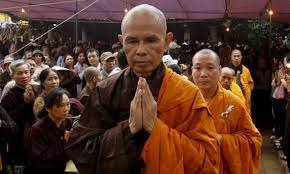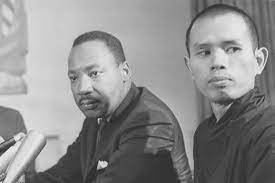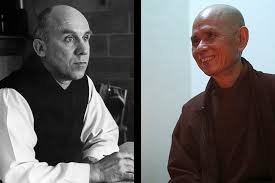Martin Luther King, Jr. and Thich Nhat Hanh
Thomas Merton and Thich Nhat Hanh
“Blessed are the peacemakers, for they will be called children of God.” (Matthew 5:9) These familiar words of Jesus are especially meaningful this week in light of the death of Thich Nhat Hanh at the age of 95. For six decades, he was known world-wide as a leading practitioner of nonviolence. As a Buddhist monk in his native Vietnam, he helped develop “engaged Buddhism” that combined commitment to mindful meditation and nonviolent action for reconciliation. When the Vietnam war tore his country apart, he sought to bring the warring parties together in a spirit of compassion. Leaders in both South and North Vietnam rejected his efforts, and Thich Nhat Hanh was forced into exile for nearly 40 years. In the 1960’s, he came to the Untied States for several years and became a leader in the peace movement. He met with Dr. Martin Luther King, Jr. in 1966 and was instrumental in Dr. King’s decision to come out publicly against the war in Vietnam. Dr. King nominated Thich Nhat Hahn for the Nobel Peace Prize in 1967. Unfortunately, no Peace Prize was awarded that year. The famous Catholic priest and contemplative activist Thomas Merton wrote an essay titled “Thich Nhat Hanh Is My Brother.” The following quote from that essay speaks to their common commitments that connected them across the boundaries of nationality, race, and religion:
He is more my brother than many who are nearer to me by race and nationality…He and I deplore the war that is ravaging his country. We deplore it for exactly the same reasons: human reasons, reasons of sanity, justice, and love.
After the war ended, Thich Nhat Hanh continued to embody and teach the way of compassion and nonviolence to thousands of people around the world. He emphasized simple practices open to everyone that focus on living in the present moment with a spirit of compassion for all. The following short verse is an example of such a practice:
Breathing in, I calm body and mind.
Breathing out, I smile.
Dwelling in the present moment,
I know that this is the only moment.
Commenting on the practice, he wrote, “We must go back to our true selves. These practices – breathing, smiling, and being aware – help you go back to your true self. Practicing them in our civilization is very difficult. All things seem to work in concert to take away your true self…To reconcile the conflicting parties, we must have the ability to understand the suffering of both sides…That is our chance for peace. That alone can change the situation.”
In our world and society that is characterized by so much division and violence, the teaching and witness of Thich Nhat Hanh are still important today. Even more important and necessary are people of faith who practice and embody peace within our own lives and in all our relationships. The blessing of Jesus proclaimed centuries in Matthew 5:9 is not limited to any one religion or philosophy. Thich Nhat Hanh was indeed a peacemaker who is a child of God.
The video posted below features an interview with Thich Nhat Hanh by Oprah Winfrey. The whole video is well worth your time, but the first ten minutes focus on the era of the Vietnam war and his relationship with Dr. King.



